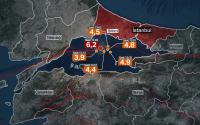23 June 2007Rob Crilly
Climate change – with its associated failure of rains and expansion of deserts – lies at the heart of the bloody conflict in Darfur, a panel of United Nations scientists said yesterday.
They gave warning that Sudan was unlikely to achieve peace until it tackled the accelerating environmental damage responsible for exacerbating tribal and political tensions.
But their highly controversial analysis failed to win over some regional experts. Darfur peace campaigners say that climate has a limited role compared with the actions of a brutal Government intent on genocide.
More than 200,000 people have died in Darfur’s four-year conflict. Two million more have been forced from their homes by fighting that pits government forces and their Janjawid allies against rebels – drawn largely from settled farming tribes – who believe that their people have been neglected by the Khartoum Government. Yesterday’s report links the conflict to clashes over scarce resources, including water and land. It concludes that there is evidence of long-term climate change in several parts of Sudan, with rainfall irregular and markedly lower, especially in the Darfur states. In North Darfur, in particular, precipitation has fallen by a third in the past 80 years.
The report also says that desertification is Sudan’s biggest environmental problem, with deserts having spread up to 120 miles southwards since the 1930s. It forecasts that future climate change could reduce crop yields by 70 per cent in the hardest hit areas.
The result is that farming practices are under ever greater strain while nomadic herdsmen are struggling to find pasture for cattle and camels. This competition for resources has exacerbated long-standing tensions between the Arab, nomadic herders and the farming tribes.
“Ignoring these environmental issues will ensure that some political and social problems remain unsolvable, and even likely to worsen, as environmental degradation mounts at the same time as population increases,” the report said.
It also cautioned that Sudan’s large displaced population was having a damaging effect on the environment. Aid camps are likely to face dire water and charcoal shortages in the near future.
Achim Steiner, the executive director of the United Nations Environment Programme, said that environmental factors would increasingly be the cause of conflicts around the world. “Sudan’s tragedy is not just the tragedy of one country in Africa – it is a window to a wider world, underlining how issues such as uncontrolled depletion of natural resources like soils and forests, allied to impacts like climate change, can destabilise communities, even entire nations,” he said.
But the scientists’ findings failed to convince some regional analysts.
Eric Reeves, an American academic and leading authority on Darfur, said that there was no doubt the region had suffered from global warming, but he added that climate change was being used as an excuse by the UN to explain its inability to halt the killing.
“It is essential to understand how badly Khartoum has failed areas on the geographic periphery, how badly it has managed its agricultural sector and how brutally it has treated people in the marginalised areas,” he said.
The UN report recommended trying to reduce the environmental impact of the oil industry in central Sudan and the promotion of more sustainable agriculture. Current farming methods are rainfed and poorly managed, leading to large-scale forest clearance, land degradation and loss of wildlife. Nearly 12 per cent of Sudan’s forest cover has gone in 15 years, it says.
The total cost of the report’s recommendations is put at about $120 million (£60 million) over three to five years – easily affordable for a Government that earns more than $5 billion in oil exports, the report adds.
http://www.timesonline.co.uk/tol/news/world/africa/article1975132.ece






